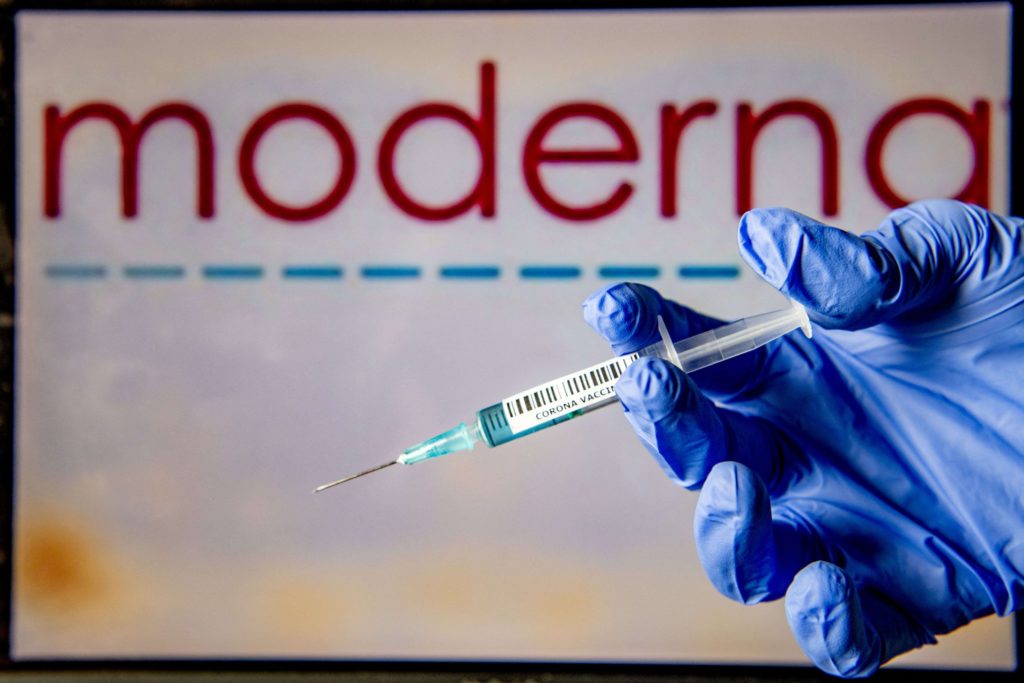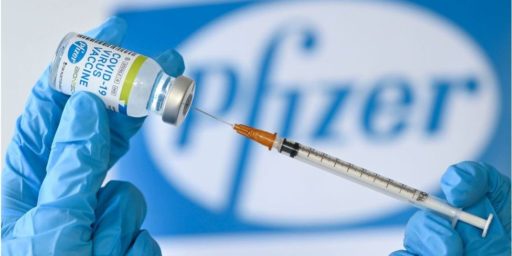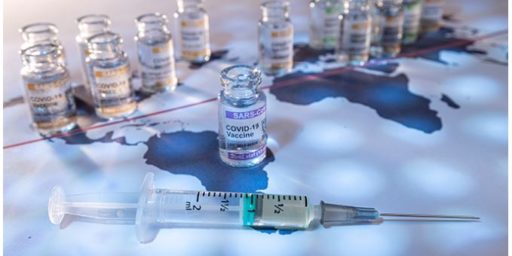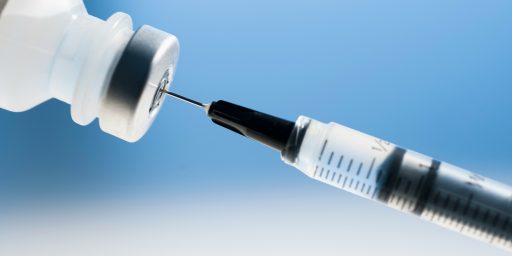FDA to Authorize 2nd Booster for Over-50s
The public health community is divided on whether it's a good idea.

After days of speculation that the Biden administration was going to recommend that those of us over 50 get a fourth dose of the vaccine, NPR reports that the FDA is about to approve the move.
Anyone 50 years and older could soon be eligible for a second booster dose of the Moderna or Pfizer-BioNtech COVID-19 vaccine. The Food and Drug Administration is expected to authorize the additional booster shots without holding a meeting of its independent vaccine advisors.
The plan comes as evidence increases that protection from three shots is fading and a fourth shot would help boost immunity back up. And as BA.2, an even more contagious version of the omicron variant, continues to spread in the U.S., concern is mounting it could fuel another surge.
“We have a large number of people who are at least four to six months past their third shot,” says Dr. Eric Topol, founder and director of the Scripps Research Translational Institute, who supports the move.
“Without protection against the omicron variant, particularly now we’re confronting BA.2, there’s a very high risk of hospitalization and death,” he says.
Having already received three doses in just over a year, getting another—with the after-effects many of us experience—is a lot. And the thinking here seems to suggest that we’re going to need boosters every four to six months. That’s just nuts.
And, frankly, it’s rather odd to “authorize” another dose without so much as a meeting. And authorizing without recommending will simply add confusion to an already fraught environment.
But others question the plan. The vaccines are still doing a good job of protecting people from getting seriously ill. Critics say there just isn’t enough evidence yet that another shot is needed and that it would provide stronger protection that would last.
“From a scientific perspective, we still don’t have definitive evidence that giving a second booster dose is the right way to go in older people,” says Dr. Celine Gounder, an infectious disease specialist and a senior fellow and editor at Kaiser Health News.
She says data out of Israel shows an additional booster dose does reduce the risk of severe disease, hospitalization and death for people over the age of 60. But she points out it’s unclear how long that extra protection actually lasts.
“I don’t think it hurts,” Dr. Carlos del Rio, an infectious disease researcher at Emory University told NPR. “But the reality is the benefit against infection will be short lived and thus likely of little benefit for most people over 50.” He also cites the Israeli data showing benefits for those 60 and older.
One of the original rationales for getting everyone vaccinated was to achieve herd immunity. The idea being that the shots didn’t just protect us individually but benefitted the whole community. But it’s now clear that was a pipe dream—and not just because so many are hesitant or recalcitrant.
Regardless, “it couldn’t hurt” is less than a persuasive rationale since, indeed, it does hurt. Some people are incredibly needle-phobic. Many of us experience follow-on symptoms that render us incapable of work for a day or so. (Which is a pretty big deal for those who get paid by the hour.) And that’s to say nothing of the real possibility that we’re rendering the vaccine less effective.
Administration officials say it’s important to give people the option of a second booster as quickly as possible. The plan to offer it to people younger than 60 was made to ensure that more vulnerable people, particularly people of color who are more likely to suffer other health problems that put them at risk, also have the option of an additional booster.
But other infectious disease specialists say the administration should be focusing on getting people their primary doses and first boosters.
“What concerns me is that we are not investing in increasing the coverage of booster doses and even the primary doses,” says Dr. Saad Omer, the director of the Yale Institute for Global Health. “These are the things that are not receiving enough attention.”
Unlike previous authorizations, the FDA is not expected to make the 2nd booster a recommendation for everyone, but rather an option for those who want it.
Again, I’m dubious of the “Hey, you can get another dose if you want it! It’s up to you!” approach. If there’s no consensus among public health professionals, how the hell are normal people supposed to make that judgment?






The only question in my mind is whether an additional booster will be effective. We can’t simply assume it; there needs to be empirical evidence.
The second booster has demonstrated it is effective in Israel; at least that was in one of the articles I read about this.
I have a family member with an autoimmune disorder, I hate being sick, I’m not needle-phobic, and the only side effect I experienced from the vaccine and my first booster was a sore arm. I’ll get a second booster when I’ve reached the 6-month mark.
I find this fairly straightforward. There is not enough evidence to recommend but there is enough to say that it doesn’t do any harm. Because of the Israeli study, there is a segment of the population that wants it. So the Feds are saying, well, exactly what they said.
As for, “we should instead be working to get first doses into arms”, well that’s just a stupid comment. These things are not mutually exclusive.
I just passed the 5 month mark. I’m 68. My wife works in schools. Seems to be a no brainer to me.
Why is that nuts? If that is the reality, then that is the reality. May be undesirable but not nuts.
Don’t understand the argument that we don’t know how long extra protection actually last. We know it fades. The real question is if there are diminishing returns with regular additional shots.
We take a lot for granted in this country. A horrible disease the general public has mostly forgotten is on the rise.
As tuberculosis cases rise, San Antonio’s Texas Biomed to be one of nation’s first training centers
People who’ve actually lost work? Got a number? I don’t either. But you know who does have a number? The CDC. And I suspect “rare” would be closer to the truth than “many”. And you know what else can cost you days of work? COVID. I’ll be getting another booster when available. For something with essentially no downside, “It couldn’t hurt.” is a perfectly fine reason. Honestly, James, you seem to be dancing close to the Republican argument, “I donwanna.” I know it would be more satisfying for the FDA to come out and say, “Everybody should voluntarily do thus and so and then COVID will be over.” But that’s just not the way it works.
“Want to get a booster that increases your odds of not getting infected, and failing that really increases your odds of not dying?”
“What’s in it for me?”
Sign me up. When can I get my 4th.
Given that we are offered a booster for the flu on an annual basis, giving one semi annually doesn’t seem terribly unreasonable.
Interesting opinion piece in the NYT this morning, a discussion by evolutionary biologists that specialize in viruses on the future of Covid 19. My layman’s read on this is we’re headed to a world of boosters that have been customized to predicted variants.
On a more serious note, shot 1 of Pfizer didn’t produce any side effects. Shot 2 gave me a couple of days of sore arm. Booster shot of AstraZeneca gave me sore arm, and one night of mild fever.
Or, to put it succinctly, there were zero negative effects of consequence.
I’ll take a second booster, and a third, and one every week if that’s what it takes.
Still, we’re going about this the wrong way.
IMO, the vaccines against the original strain were very good and could also tackle the Alpha variant well enough (maybe Gamma, too), but they fell short for Delta and Omicron. So we need an updated shot specifically directed to Omicron, not just the brute force approach of boosters. The latter increase the number of neutralizing antibodies in the circulatory system, but these antibodies aren’t as good at neutralizing Omicron.
BTW, while there are breakthrough infections, they are not at a 100% level. Some people are exposed to Omicron and don’t get infected. So the vaccines still prevent infection, albeit at lower rates, and still provide a check on the spread of the trump virus.
That terrible feeling? It’s likely that’s how bad you’d have experienced COVID for real or worse. It’s possible those having poor reactions to the shot are those who would have been hospitalized giving the immune reaction so that’s you dodging a bullet. In some other timeline, you forgo the shot’s temporary misery and end up being miserable for days.
As for not being able to take off due to being hourly I’m sympathetic to a point but those same souls would continue working once infected for that same reason. If they caught COVID, they go to work and spread it to everyone since they can’t miss work. If you can’t take the hit of missing work for a shot, you can’t take the hit from COVID in any of it’s forms – damned if you do and damned if you don’t. Add in mask wearing dropping off and now you’ve gotten right back to the beginning where they’re in prime position to get sick and infect others.
Does it sucks? Why yes it does. Blame those who inhibited the efforts to keep this under control for why you now have a regulars inconvenience to deal with. Thank an inconsiderate maskhole or denier for your life being just a bit harder. Boosters may be a thing for the rest of our lives or COVID’s dominant strains mutate to something less harmful.
You can always do what I did a few weeks ago, ask your doctor. They know you, are aware of all your health issues and are best able to judge whether it would be helpful of not for you.
In my case, she said, “No.” Good enough for me.
As I plan to be here a while, I do at least the bare minimum to ensure I will.
At 62, I stay active, try to jog, snowboard, eat relatively well, check in on doctors at a regular basis. So, if I can avoid a higher risk of death by getting a shot that makes me feel like crap for an evening, I’m OK with that.
To ensure I will live longer, I ALSO no longer bother engaging with anti-vaxers.
Funny thing about anti-vaxers: It is easier for them to believe that there is a deeply convoluted global conspiracy of globalists and drug manufacturers that is hiding behind an attempt to save their lives… than believe that one man/country paid trolls to sow division in the USA with the intent to create disarray so that their invasion of a neighboring country would proceed unabated.
Occam’s razor, right… only time will tell.
@gVOR08:
One of my friends had the worst reaction I know of and she compared it to a mild flu. Nothing she hadn’t powered through to work before. Her work is very physicals and had to take a long soak afterwards for her muscles but it was a brief unpleasantness. She’s had worse and I bet so have all of us.
Americans go to work sick ALL THE TIME. It’s a literal way of life for a huge part of our population to not take time off when feeling unwell. If you’re hourly you are using to rolling out of bed feeling like hell, sore back and head, fever, cough and the works but still punching that card. If you can do that, the after-effects of the shot aren’t gonna kill ya. A sore arm (the usual complaint) isn’t going to be any worse then that lingering cough you used to suppress a few years ago waiting on the customer.
Excuses is all it is. Not feeling well after the shot would be less then what they’d feel when they trudged to work sick from COVID – which they have to do since they can’t miss work.
I don’t see the drama here. The first booster enhanced immunity. It seems likely a second booster will as well. I’m heading overseas for May and June and despite being needle-phobic I am pleased to be offered a chance to strengthen my immunity. Pretty simple.
Public health officials spend their entire day managing public health. I am not qualified to judge their decisions or responses based on the limited information I have about vaccines, pandemics, this particular virus – or virology in general.
It’s fun to pretend we know more than the CDC does, but I will trust their guidance – particularly as they are managed by a president who doesn’t carry the stench of corruption and graft that the previous administration did.
I trust that the CDC is making the right decisions.
@Tony W:
My feelings are a bit more nuanced. I trust that the CDC is making the best decisions for the public health given the information available. Note that the advice to specific individuals may be different. What do I mean by that? Here is an illustration:
One of the few studies on the efficacy of non-medical people wearing masks during a viral pandemic came about in Asia (I forget the specific country) during the SARS outbreak some years ago. They identified families of SARS patients, gave them surgical masks, trained them to use them whenever they were in the room with the sick person, and followed up with reminders. The data showed that there was little to no reduction in the family members contracting SARS themselves. They concluded that a public initiative to promote mask wearing was not worth the cost, time and effort of Public Health departments. But they did not conclude that individual mask wearing was not beneficial, because they didn’t have data on compliance. It may have been that given that people were living in close quarters with infected individuals they simply weren’t compliant enough to make a difference, but it is still possible that if any person had been 100% compliant it would have reduced their chance of infection.
When a public health agency says that they don’t recommend a particular public health initiative, it’s not the same thing as saying it is not useful at the individual level.
(Note that there are probably 100 other reasons other than compliance why the mask wearing initiative failed with this particular virus in this particular country with this particular study group, and that those reasons might not apply to a different virus or to a different country or to a different group of people.)
I’m getting tired of this trope. ‘Only one out of the*many*’ reasons for getting everyone vaccinated was the ‘possibility’ that herd immunity could be achieved. The other, more significant ones included reduction in fatality, reduction in hospitalization, protection of the elderly and higher risk individuals, and reduction in susceptibility.
Recall that even a 50-60% reduction in infections or fatalities would have been considered a fantastic outcome for the vaccines then in development in 2020. They’ve far exceeded expectations, fortunately for us. Sure, herd immunity would’ve been like the cherry on the top of a chocolate sundae, but we still got the sundae, even with some whipped topping.
Hell, I get a yearly flu shot and it’s probably less likely to protect me from hospitalization and death than another COVID-19 immunization.
@Argon: I’m also getting tired of the trope, “If we wasn’t for the morons, this would be over by now.” There was very little chance that COVID a could have been eliminated from the world by any measures. What those protective measures actually gave us was time to develop and administer effective vaccines. The measures in place now are primarily about protecting the morons. They are the ones most at risk, by two orders of magnitude.
I dismissed ‘herd immunity’ from early on. There are 8 billion people on this planet, connected by land, air and sea. The idea that we would somehow deprive the virus of hosts in which to gestate new variants was absurd.
I will be getting this the minute that I can.
Only an idiot, or someone who for whatever legitimate medical reason cannot, would not get this.
@Argon:
@MarkedMan:
Whether it was the intent of any vaccine or not, fact is we’ve got good levels of herd immunity against things like polio, measles, pertussis, and many more. In the case of smallpox, we even deleted the virus from nature (the one time we drove a species extinct on purpose*).
Contagious respiratory disease transmitted from person to person, though, like flu or COVID, seem to resist herd immunity, mostly through adaptive changes to the pressures exerted by vaccines. But it’s certain the refusal of many, many millions the world over to take the vaccine helps the virus a great deal.
Flu is far less deadly, so maybe annual shots are fine. COVID is far more deadly, so maybe a shot twice or three times a year will be indicated.
If/When we get variant specific vaccines or polyvalent vaccines, we may need two doses per “shot,” meaning two shots per year would be four actual shots.
I’m fine with all that.
BTW, Omicron is described as “mild” or “milder.”One ought to ask “milder than what?” It seems to be milder than Delta, which is good, but not milder than the original strain or the earlier variants. So it’s still quite dangerous. Less so if you’re vaccinated, but still a concern given breakthrough infections.
As soon as my local CVS offers the second booster, I’ll nip over to get it. Until we’re dealing with a version of COVID-19 that is milder than the expected side effects from the vaccine, I’ll keep boosting.
(I can see people being cranky about getting a second booster if it hasn’t been revamped to deal with whatever variant is out there, however.)
@Daryl and his brother Darryl: I’ll get it when I get my annual flu shot, or earlier if it looks like we are spiking up. I’m in a low risk state and would like to preserve optimal protection for the flu season
@Scott:
I have to admit that if asked to guess on the TB thing, I would have said California, Texas, Florida, and New York, in that order because of total population, and add ten percentage points to the group total because of their immigrant populations. That would have got me to 43%.
If you look at a dot map of total Covid cases in the United States, to a first approximation it looks just like a dot map of population.
I’ll get one every month if needed. What’s the downside?
It’s worth pointing out that the states with the highest death rates are all trump states except those big population centers like NJ and NY that were hit really hard early on before we knew how to even treat the pandemic or had done anything to protect the elderly. The death rate is nearly twice as high. If you look at the post-vaccination comparison it is even more dramatic. And if you go by county it is yet more dramatic. Neshoba County, Mississippi is getting close to having 1% of the population as having died of COVID, and the rate is probably somewhat higher given the mis-reporting from county coroners. The best county I could find, Addison VT, has a death rate 1/20th that.
As someone who had a mild case of omicron despite being boosted? I’ll be first in line for dose #4. It wasn’t awful for me but my GI system is still unhappy and my reaction the the three previous immunizations was nil. Would like to swap Pfizer for Moderna this time. People don’t appreciate they’ve had 8+ TDAPs and 20+ flu vaccinations. Nothing unusual about #4!!
OK, I’ve headed down the rabbit hole again. Here’s a good site if you want to go state by state and pick the time line (slide the date bar on the bottom). Some factoids:
– If the country had the death rate of Mississippi we would have 1.35M dead by now. If it had the rate of Vermont we would only have 330K.
– Picking the beginning of May 2021 as a time when most people could have been vaccinated, Alabama had 165 per 100K people die. Maryland had 82
– In January of this year, unvaccinated people were 21x likelier than vaccinated people to die of COVID. If those numbers still hold, of the 871 people who died of COVID in the US last Friday, 40 of them were vaccinated and the remaining 831 were unvaccinated.
One thing that doesn’t get enough attention is that for the unvaccinated, COVID is more than 10 times as deadly as the flu. For the vaccinated, it is half as deadly as the flu.
One thing I find really sad about the Omicron surge, is that countries that had contained the spread, even through Delta, like South Korea and Vietnam, are now catching up with the rest of the world. Cases are way, way up.
I don’t know why this is. Whether a lack of vaccines, low vaccine uptake, or having relaxed prevention measures.
@Kathy: There is another possibility – the current variants are so much more contagious the methods they are using to prevent breakout are no longer sufficient. If that’s the case, it’s our good fortune that the vaccine beat the highly contagious variants into the general population. Of course, for those not vaccinated, well, sucks to be them.
@Crusty Dem:
Imagine it’s 1666 in London, height of the black plague, and you learned that the cost of survival was just tiny needles stuck in your shoulder for about three seconds, with the pricking spread out over months.
@Michael Reynolds:
Why, but there be tiny spyglasses in those needles! Leeches and prayer surely can cure what ails you. Let’s hear no more of this needle witchery!
How are we rendering it less effective? The variant have all emerged in unvaccinated populations. If anything, multiple doses should asymptote effectiveness, as they do with disease like Polio and Tetanus.
@Hal_10000:
Came here to question the same sentence. Vaccines aren’t like antibiotics treatments, as far as I know (where antiobiotic overusage leads to more resistant strains). But if there’s something I don’t know here, somebody please share.
@Hal_10000: @Franklin: I’ve seen reports, amplified by some comments from @MarkedMan on a recent thread, that suggest that, not only are boosters less effective over time but that they might actually have the inverse effect of rendering people less protected.
@James Joyner: Less effective, to my understanding, means that we are potentially squandering resources by giving additional copies of instructions to our immune systems for things it already knows.
Think of it as having a copy of the book War and Peace on your shelf, and then being given another copy of it – so now you have two. No harm was done, other than spending resources where they might be more beneficial elsewhere.
@Jen: I got my second booster on Friday, 6 months after the first, and three months after having Covid. Nothing more than a sore arm and fatigue the next day.
@James Joyner: following MarkedMan’s link, it seems that the study that found this effect (flu vaccine boosters decrease effectiveness over time) was done with children. I wonder if it has been studied in adults, and if the same effect was found? I imagine that adults are very different, given that their immune systems are both more robust in some ways (since we’ve been exposed to more germs than kids), and weaker in other ways (since aging decreases our immune systems’ functioning).